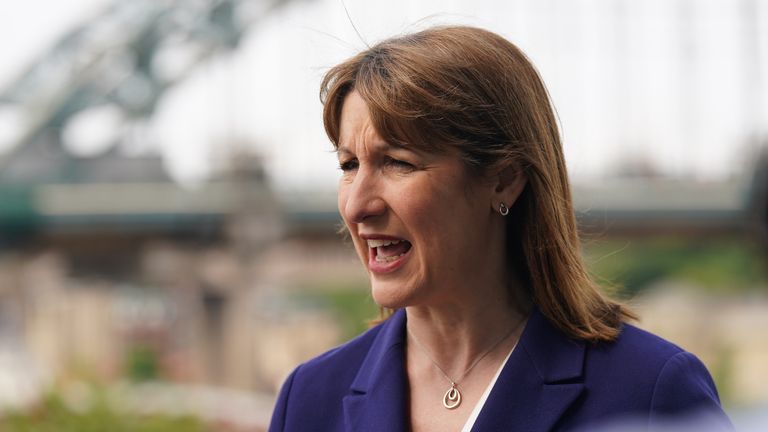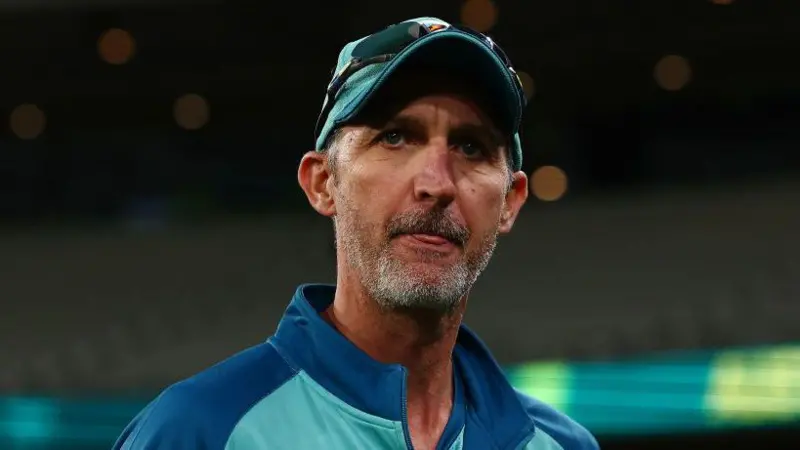Former Labour leader calls for wealth tax on assets above £10 million
The Labour Party is under scrutiny a year into its tenure, with Reform UK having surged to top the polls while Sir Keir Starmer's approval rating has plummeted.

Former Labour leader calls for wealth tax on assets above £10 million
Speaking to Sky's Sunday Morning With Trevor Phillips, former Labour leader Lord Neil Kinnock said Starmer's Labour "depressed expectations" before entering government to ensure they seemed credible after the Corbyn era.
They also "limited themselves by saying they were going to rigidly stick to fiscal rules and that they weren't going to substantially or indeed increase taxes on working people at all".
He said: "That means that unless you are looking for other original sources of revenue in order to invest in public services and long term investment, then you are really jammed into a bit of a corner."
Asked if the government should reconsider its fiscal rules, which determine spending and borrowing limits, he suggested that cabinet would be ready to hear it.
It appears to him that "the essential discipline and caution of opposition" has been "stiffness" and "stagnation" in government.
"It's not actually the accurate picture, but the appearance is being given that they have [been] bogged down by their own imposed limitations," he argued.
"There are ways around that, ways out of it, pathways that I think people are willing to explore, and actually, would commend themselves to the great majority of the general public."
Lord Kinnock suggested that a good way of raising funding would be imposing a 2% tax on assets above around £10 million.
A "substantial gesture in the direction of equity fairness" would "make a difference", he argued, and sticking to their fiscal rules would ensure stability.
U-turn on welfare cut 'has come at cost'
Sky's Trevor Phillips put to the education secretary that after the welfare bill was gutted after the back bench rebellion, taxes are going to have to rise to fill the fiscal black hole.
Bridget Phillipson said tax and spend are matters for the chancellor, but added: "The decision we've taken in the last week has come at a cost, yes.
"And the fiscal rules that we have matter. They matter in terms of economic stability and providing that strong basis for growth."
She said there are "green shoots" with "record levels of business confidence" and "more jobs being created".
But "getting growth growing" is key to "break that link that we've seen in the past around tax and spend".
Asked if Labour remains committed to not raising income tax, VAT, or employees' national insurance, she did not say yes.
Phillipson said: "We take our manifesto commitment seriously, of course we do, around making sure that working people are better off. That's something we've been focussed on right across government."
But she added that it is for the chancellor to set out fiscal policy.
'We haven't got everything right,' education secretary admits
The final guest on this week's edition of Sunday Morning With Trevor Phillips is the education secretary, Bridget Phillipson.
Asked what grade she would give the government after a year in power, Phillipson said: "I'm not going to answer, I'm afraid.
"We've done some great things, but there's clearly more that we need to do."
Voters are telling her that they really want to see change, and she pointed to her expansion of "Family Hubs" that she is announcing today in order to help parents across the country as an example of a change.
Asked if Labour could do better, Phillipson said: "Of course we could. You know, government has its ups and downs. We haven't got everything right. I think they're clearly things that we need to consider, particularly from the last week.
"But we are driving forward change in so many areas that would simply not come with a Conservative or Reform government."
Lord Coe: Obesity is not just a health problem - it's a political problem
We've just been speaking with Lord Sebastian Coe, current president of World Athletics and the head of the organising committee for the 2012 London Olympics.
Part of the legacy of the games was meant to be better health for Britons, but today, a quarter of children are leaving primary school obese, and Sky's Trevor Phillips put to Coe that that is a scandal.
He replied that it's "a multifaceted problem" and a "political problem" in large part.
"We tend to see obesity as being a purely a health issue. Actually, it isn't," he said.
"It's about tax and spend, it's about good healthcare policies, obviously, but it is actually also about having good sports policies. It's about funding youth programs properly."
On the legacy of the 2012 Olympics, Coe argued that more people are now running and cycling, and doing endurance sports.
"I think London did something that actually managed to stem the flow - up until that point, we were really haemorrhaging, participation," he continued.
"It is at least stabilised. But no, you're right, it is the biggest challenge - between the age of eight and 12, the average child in the UK becomes 50% less active.
"And that is not just a health issue, that is something governments have to see as a cross-cutting issue."
Stride defends Badenoch for drawing attention to crying chancellor
As you no doubt saw, Rachel Reeves was seen crying during PMQs. And while she was questioning the prime minister, Tory leader Kemi Badenoch drew attention to it, saying she looked "absolutely miserable".
Asked if that was the right thing to do, shadow chancellor Sir Mel Stride replied: "I don't think there was anything personal in that moment at all."
He said he actually messaged Reeves just after PMQs "to say that I felt for her and I hoped that she was okay".
But he went on to say that Kemi Badenoch's job is to hold Labour to account, and after the shambolic welfare U-turn this week, "it's not surprising that she's up there vociferously holding Keir Starmer to account".
Starmer 'leading rudderless administration' that has failed to get a grip, says Stride
It was a very difficult week for Rachel Reeves, who had to back down on the welfare bill and was then seen crying in PMQs due to a "personal matter", and amid calls for her to be sacked as chancellor.
Asked if he is glad she wasn't sacked, Sir Mel Stride said that if she is sacked, then Sir Keir Starmer should go as well due to the "chaos" of recent weeks, and added that they have "lost complete control".
Pushed on the question of Reeves, Stride said: "I'd like to see all the Labour front bench step down, because I think we've had a year of utter underperformance."
He points to illegal migration as a key problem, as well as "the chaotic U-turns" of recent weeks.
Sir Keir Starmer, he said, has been "leading a pretty rudderless administration that has not got to grips with some of the serious challenges that we have as a country".
'British citizenship should mean something' for benefits, says Stride
The Tories are set to table an amendment to the government's already decimated welfare bill to exclude foreign nationals from Personal Independence Payments and other sickness benefits.
Sir Mel Stride told Sky's Sunday Morning With Trevor Phillips that the Tories want the government to "come through with a discussion" on the topic, saying the number of foreign nationals claiming those benefits has doubled in recent years.
Trevor noted that foreign nationals pay taxes too, and asked why they should be punished.
The shadow chancellor replied that "British citizenship should mean something".
"I think most people would agree with the idea that, you know, if you are to benefit from our welfare state and health benefits and all sorts of other things, it's not unreasonable to expect that to be for those who have citizenship in our country," he argued.
Trevor put to him that this is designed to appeal to Reform UK supporters, but they won't actually do it.
But Stride rejected that, saying it is about "getting a grip on the welfare bill" that is ballooning, and getting people back into work.
He added: "We believe in work, and we believe that we should be there having a welfare system that encourages and incentivises work at every turn."
Wealth tax would be 'the worst thing to do', says shadow chancellor
The next guest on this week's edition of Sunday Morning With Trevor Phillips is the shadow chancellor, Sir Mel Stride, who was asked first what he makes of Lord Neil Kinnock's suggestion of a wealth tax on assets above £10 million (more here).
Asked for his view, Sir Mel said: "I think it would be the worst thing to do."
He said Labour has already imposed "far too many taxes on wealth creation", pointing to the employers' national insurance rise in particular, which, he argued, is why the economy is not growing "in the way that it should", and high net worth individuals are leaving the UK.
The highest net worth individuals pay around a third of all tax, so if they leave, it's "lost tax that's just gone straight out of the door".
New left-wing party should be called the 'Farage Assistance Group' - Kinnock
On Thursday, Zarah Sultana MP quit the Labour Party and announced she was going to co-lead the founding of a new party alongside former Labour leader Jeremy Corbyn.
Reports have emerged that she very much jumped the gun, and on Friday, he dampened her announcement by saying that "discussions are ongoing".
Putting aside the botched announcement, Sky's Trevor Phillips asked former leader Lord Neil Kinnock how much of a threat such a party would be.
He replied that he has been trying to think up a name, saying: "In a comradely way, I'd suggest one: it would be the 'Farage Assistance Group'.
Lord Kinnock said any division in the anti-conservative vote "can only assist the parties of the right".
The splintering of the left "can only be of assistance to the enemies of Labour, of the working class" and "can only be of benefit to the egos of those who are running such a party".
He went on to suggest that Sir Keir Starmer as prime minister does not need to worry much about Reform UK or Jeremy Corbyn, but the Labour Party taking the threat "very seriously" because of the "seepage" of votes away from them.
Lord Kinnock labelled Reform UK "the enemy" because they are "finding and harvesting grievance, resentment, division" and then "finding someone to blame".
Their strategy is to offer "simplistic responses, never answers to very complex problems" and hope that people are so frustrated that they'll vote for them.
He suggested that they are using a "similar playbook" to Oswald Mosley and the fascists of the 1930s - although was very clear he is "not accusing Reform of being fascist, of course".
Finally, Lord Kinnock said it's "quite probably" that the Tory-Labour duopoly is over "for a period", and called on Labour to reverse the trend with "high levels of public investment in the things that matter to people".
Kinnock: Labour accomplishments 'obscured' by U-turns and internal fights
The first guest on this week's edition of Sunday Morning With Trevor Phillips is Lord Neil Kinnock, who led the Labour Party from 1983-1992.
He told Trevor that Labour's first year in government was "not a mess", but said: "What's gone wrong is really the lack of a narrative, a story of the objectives of the government, and why they're working towards it and how they're working towards it."
He went on to say that a series of "really commendable and absolutely essential policies" are "barely noticed".
That, he argued, is "because they're obscured by all this song and dance, and noise, drums banging and cymbals clashing of the winter fuel payment being massively reduced and then restored, the welfare program, the two child benefit cap, the cuts in development aid".
"All of those negative things that really are heartily disliked across the Labour movement and more widely, much more widely," he said.
"And that means that apart from the distaste for undertaking those policies, the cloud hangs over the accomplishments of the government, which are substantial and will become greater, and people are not getting the message."
The government should focus on communicating their accomplishments, he added.
Asked why they have not communicated well, Lord Kinnock said they have had to "put an emphasis on caution and discipline, which was crucial in the wake of the chaos that had gone before under [Jeremy] Corbyn."
While they restored credibility, they "depressed expectations and limited themselves".
-SKY NEWS







